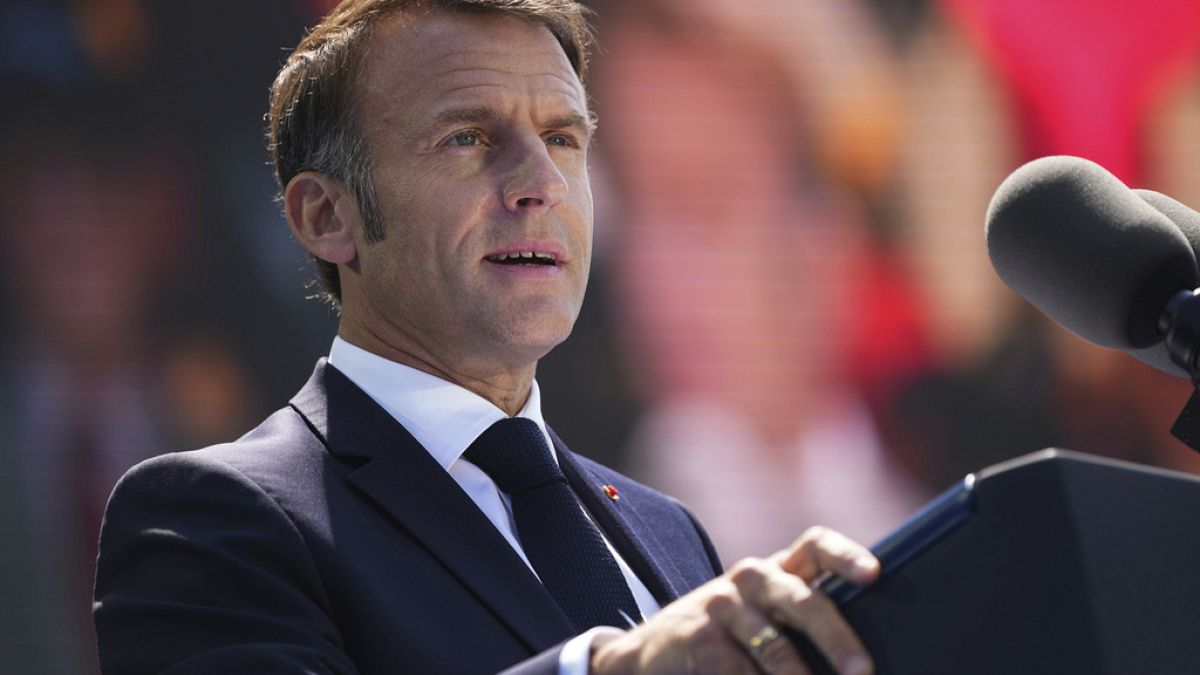The French president made the statement during a TV interview following D-Day commemorations in Normandy. The liberal leader has been criticised for his omnipresence during the election campaign.
Just three days before the European elections, French President Emmanuel Macron gave a televised interview to TV channels TF1 and France 2 on Thursday in Normandy following the commemorations of the D-Day landings.
Although historical and diplomatic reasons were cited to justify his intervention, Emmanuel Macron commented on the elections — a move heavily criticised by multiple opposing parties who feel the leader was omnipresent during the electoral campaign.
‘We need it to protect France’
“Europe has never been so threatened,” warned the French leader, referring to the rise of the far right in France and across the European continent.
Macron’s party, Renaissance, headed by Valérie Hayer, is struggling in the polls, more than 15% behind Jordan Bardella, the head of the far-right National Rally party (RN), according to the latest Euronews poll.
“I see the levels of abstention (…) and I call on compatriots to go and vote on 9 June”, said Emmanuel Macron, mentioning the fervent opponents of Brexit, who did not come out in sufficient numbers to make their voices heard during the British referendum of 2016.
“If tomorrow France sends a large far-right delegation and if other major countries do the same, Europe could find itself at a standstill,” insisted Emmanuel Macron.
“We need it to protect France,” he pleaded, warning against “a vote to vent our anger.”
Domestic issues have been at the forefront of the EU elections in France, with immigration, purchasing power and security seen as the main concerns for voters.
Jordan Bardella’s party (RN) has pitched its campaign as a referendum on Macron’s approval, particularly on these issues.
Bardella said he will demand early legislative elections if his party wins.
When asked about the possibility of calling legislative elections in case of a far-right victory, Macron declined to answer, saying: ‘I’ll go and vote, and on Sunday evening, we’ll see the results. I like to do things in the right order.”
How did other EU election candidates react to Macron’s interview?
Soon after the end of the interview, Jordan Bardella reacted to the president’s words on X (former Twitter), saying: “Emmanuel Macron confirms that by sending the largest delegation of MEPs to the European Parliament, the RN will be able to block the EU Commission’s harmful policies, such as punitive environmental measures against our farmers and the flood of migrants,” before calling on electors to go vote on Sunday.
François-Xavier Bellamy, from the traditional right-wing party The Republicans (LR), also criticised the president’s interview and announcement on the French TV channel BFM as inappropriate.
“I don’t see anything in the statement made by the president … that justifies the fact that 24 hours before the end of the official election campaign, there is such an urgency to speak to the French people,” Bellamy said.
The election campaign in France ends at midnight on Friday, after which the candidates are not allowed to speak publicly about the election until the first exit polls on Sunday at 8 pm.
Macron’s interview could be deducted from Valérie Hayer’s speaking time
After multiple parties filed complaints on Monday after the announcement of Macron’s scheduled interview, the country’s media watchdog, Arcom, warned it could deduct the interview from the EU candidate Valérie Hayer’s speaking time.
Why? During election campaigns in France, the amount of airtime given to a certain candidate or party is counted according to strict rules.
For the European elections, speaking time for all candidates must be fair rather than equal.
A list’s speaking time is deducted when the head of the party speaks, but also when one of his supporters speaks or if a guest announces his support for a particular party. This rule also applies to the head of state.

